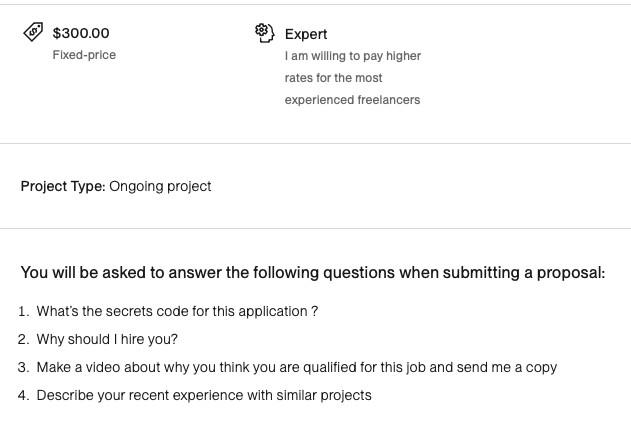Freelancers are a vital part of today’s gig economy, offering specialized skills across a wide range of industries. Whether it’s writing, graphic design, web development, or marketing, freelancers bring flexibility and expertise to the table. However, one of the most frustrating aspects of freelancing is the unrealistic expectations and demands some clients have—particularly when it comes to job bidding.
While it’s natural for clients to want the best possible work for their budget, there’s a growing trend where potential clients ask for far too much in exchange for too little. From over-the-top requests for video pitches to asking for professional degrees or near-impossible turnarounds—all while offering low rates—many clients fail to understand the value of the work they’re requesting.
The above image is an actual snapshot of a project I ran into on Upwork. It had fewer than 5 bids on it, which made me wonder if there was something unusual about it. And boy was there ever!
Here’s a look at some of the most unreasonable demands freelancers face during the bidding process, and why they can be problematic for both the freelancer and the client.
Demanding video pitches for low-paying jobs
One of the more recent trends in freelancer job postings is the request for a video pitch as part of the application process. While providing a video might be reasonable for certain types of roles (such as those involving public speaking or on-camera work), it’s becoming increasingly common for clients to ask for a video introduction, even for low-budget gigs.
Why is this unreasonable?
- Time and effort: Creating a video pitch takes more time and effort than submitting a written proposal. Freelancers typically apply to multiple jobs, and creating a personalized video for each one can become a massive time sink.
- Cost: High-quality video production requires good lighting, sound, and editing—all of which take additional time, tools, and skill. Asking for such a submission without offering fair compensation is a clear red flag.
- Unnecessary for most jobs: For many freelance roles, such as writing, coding, or graphic design, a video pitch does little to show actual skills. A well-crafted proposal or portfolio should suffice.
Asking for a degree or formal education for freelance work
In industries like design, writing, or digital marketing, many clients are now requesting formal degrees or certifications in their job listings, even though the freelance market is built on skills and portfolio work, not on traditional credentials.
Why is this unreasonable?
- Skill vs. degree: Freelancers are often hired based on their portfolio and experience, not their educational background. Many successful freelancers didn’t attend formal schools or receive degrees, yet they possess valuable, marketable skills that clients want.
- Overemphasis on paper credentials: By prioritizing a degree over experience or a strong portfolio, clients risk overlooking highly qualified freelancers who could deliver exceptional work at a better price.
Clients in creative or technical fields should focus on a freelancer’s portfolio, experience, and ability to produce results, rather than on the piece of paper hanging on a wall.
Expecting quick turnarounds for complex projects
Freelancers often face pressure from clients to deliver complex projects in unrealistic timeframes. While quick turnarounds are sometimes necessary (e.g., in urgent circumstances or for shorter tasks), asking for a comprehensive project to be completed in an absurdly short time frame is unfair, especially when the budget is limited.
Why is this unreasonable?
- Quality takes time: High-quality work—whether it’s a well-researched article, a polished logo, or a custom-built website—requires time to execute properly. Asking for something intricate or detailed to be completed in just a few hours or days without adjusting the budget accordingly means the freelancer would likely have to cut corners.
- Burnout and overwork: Freelancers already juggle multiple clients and projects, and consistently asking for quick turnarounds can lead to burnout, lower quality work, and missed deadlines. Clients who demand rapid delivery on complex tasks should understand that it comes with a cost—either in time or quality.
- Lack of respect for professionalism: Expecting fast results for less pay can feel like the client doesn’t respect the freelancer’s time or expertise. Professional freelancers work efficiently, but they also need to be given the necessary time to ensure quality output.
Asking for extensive revisions without adjusting compensation
Another common issue is clients requesting endless revisions to work, often for the same low budget. While feedback and revisions are a natural part of the process, there are limits to how much a freelancer can revise without being fairly compensated.
Why is this unreasonable?
- Time is money: Revisions take time. If a client asks for multiple rounds of changes, especially if the scope of the work grows as a result, they should be prepared to adjust the payment accordingly. Asking for unlimited revisions without offering more money or time can lead to resentment and dissatisfaction.
- Unclear expectations: Sometimes, clients don’t fully define their expectations upfront, which results in revisions and changes once the work is already in progress. Freelancers should not be penalized for clients’ lack of clarity in their initial instructions.
Unrealistic budgets for high-skill work
One of the most common complaints among freelancers is the low budgets offered by clients who ask for high-skill, high-effort work. A designer may be asked to create a complex logo for $50, or a writer might be expected to produce 2,000 words of highly researched content for $20.
Why is this unreasonable?
- Undervaluing expertise: Skilled freelancers spend years honing their craft, and their work requires expertise, time, and effort. Offering a low rate for these services can not only result in subpar work but also signal a lack of respect for the freelancer’s talent.
- Inequitable compensation: Clients may expect to get premium work at a discount rate, which is neither sustainable nor fair. Freelancers need to set boundaries on what they’re willing to accept for their work and ensure clients understand the value they bring to the table.
Asking for samples or prototypes without compensation
It’s not uncommon for potential clients to ask for free samples or even prototypes of work before hiring a freelancer. While it’s understandable that a client wants to ensure the freelancer’s skills align with their needs, asking for full samples or prototypes is often an unreasonable demand—especially when the job is low-paying.
Why is this unreasonable?
- Time and energy: Providing free samples means the freelancer is working without compensation. For more complex jobs, such as website design or a custom-written piece, this can be a significant time investment without a guarantee of getting hired.
- Lack of professionalism: Requiring free work upfront can indicate a lack of professionalism or fairness on the client’s part. Freelancers typically offer a portfolio of past work to showcase their skills—asking for new, unpaid samples puts freelancers in a difficult position.
To conclude: respect for freelancers is essential
Freelancers are professionals who deserve to be compensated fairly for their time, expertise, and effort. While clients are justified in wanting high-quality work, expecting video pitches, formal degrees, impossibly fast turnarounds, endless revisions, and free samples in exchange for low budgets is simply unrealistic.
Clients should understand that a successful freelance relationship is based on mutual respect and realistic expectations. By recognizing the value that freelancers bring to the table and offering fair compensation for their work, clients can attract top talent, build strong working relationships, and get the best results for their projects. Freelancers, in turn, should continue to set clear boundaries and advocate for their worth in the marketplace.
If you’re a freelancer struggling with unreasonable client demands, it might be time to reevaluate the types of projects you pursue and establish clearer guidelines for your work. The goal is to work with clients who value your expertise and offer fair compensation for your skills. After all, freelancing is about both quality and respect.



